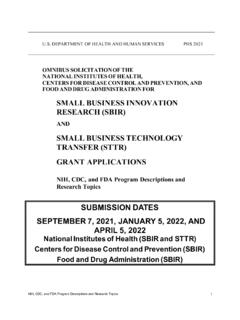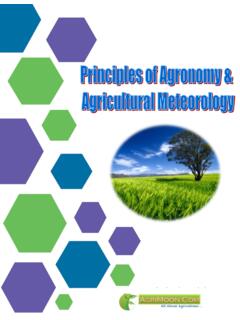Transcription of KENDRIYA VIDYALAYA SANGATHAN
1 KVS Zonal Institute of Education & Training Chandigarh KVS ZONAL INSTITUTE OF EDUCATION AND TRAINING SECTOR-33C, CHANDIGARH E-MAIL Website- Ph 0172 2621302 & 2621364 KENDRIYA VIDYALAYA SANGATHAN , ZONAL INSTITUTE OF EDUCATION AND TRAINING, CHANDIGARH STUDY MATERIAL & SAMPLE PAPERS SESSION 2021-22 CLASS XII BIOLOGY TERM - I KVS Zonal Institute of Education & Training Chandigarh 1. Ms. Nidhi Pandey, IIS Commissioner, KVS 2. Dr. V. Vijaylakshmi Additional Commissioner (Academics) 3. Dr. E. Prabhakar Joint Commissioner (Admin.) 4. Mrs. Piya Thakur Joint Commissioner (Academics) 5. Sh. Satya Narain Gulia Joint Commissioner (Finance) 6. Sh. N. R. Murli Joint Commissioner (Training) OUR PATRONS KVS Zonal Institute of Education & Training Chandigarh Our aim is to provide such brief study materials and sample papers to the student that not only guides students to the path of success, but also inspires them to recognize and explore their own inner potential.
2 The Board exam preparation is based on three pillars Concept Clarity, Contextual familiarity and Application Expertise. Our innovative and dedicated teaching materials ensure that every student gets a firm grip of each of these pillars so very essential for these arduous preparations. We also understand the importance of CBSE board exam as students' future goal depends upon the performance in board exams. We know that in pandemic situation the students feel a lot of pressure of performance in board exam. It is very important to develop the right exam temperament in students so they can tackle the pressure & surprises easily. In this direction, to release such brief study materials and sample papers will help to the students a lot. DIRECTOR S MESSAGE 1 S P Singh, TA Biology, KVS Zonal Institute of Education & Training Chandigarh S.
3 No CONTENT PAGE No 1. Syllabus Term I 2 2. Hand outs chapter-2 (Plant Sexual Reproduction) 7 3. Hand outs chapter-3 (Human Reproduction) 16 4. Hand outs chapter-4 (Reproduction Health) 24 5. Hand outs chapter-5 ( principles of Inheritance) 30 6. Hand outs chapter-6 (Molecular Basis of Inheritance) 38 7. Sample paper Term-1 (CBSE) 51 8. Marking scheme Sample Paper (CBSE) 65 9. Sample Question Paper 1 67 10. Marking scheme 1 75 11. Sample Question Paper 2 76 12. Marking scheme 2 85 13. Sample Question Paper 3 86 14. Marking scheme 3 96 INDEX 2 S P Singh, TA Biology, KVS Zonal Institute of Education & Training Chandigarh CLASS XI / XII BIOLOGY (Code No. 044) Syllabus 2021-22 The present curriculum provides the students with updated concepts along with an extended exposure to contemporary areas of the subject.
4 The curriculum also aims at emphasizing the underlying principles that are common to animals, plants and microorganisms as well as highlighting the relationship of Biology with other areas of knowledge. The format of the curriculum allows a simple, clear, sequential flow of concepts. It relates the study of biology to real life through the use of technology . It links the discoveries and innovations in biology to everyday life such as environment, industry, health and agriculture. The updated curriculum focuses on understanding and application of scientific principles , while ensuring that ample opportunities and scope for learning and appreciating basic concepts continue to be available within its framework. The curriculum is expected to: i. promote understanding of basic principles of Biology. ii. encourage learning of emerging knowledge and its relevance to individual and society.
5 Iii. promote rational/scientific attitude towards issues related to population, environment and development. iv. enhance awareness about environmental issues, problems and their appropriate solutions. v. create awareness amongst the learners about diversity in the living organisms and developing respect for other living beings. vi. appreciate that the most complex biological phenomena are built on essentially simple processes. It is expected that the students would get an exposure to various branches of Biology in the curriculum in a more contextual and systematic manner as they study its various units. BIOLOGY (Code No. 044) COURSE STRUCTURE CLASS XII (2021 - 22) EVALUATION SCHEME TERM UNIT UNIT CHAPTERS MARKS I VI Reproduction 2, 3, 4 15 VII Genetics and Evolution 5, 6 20 II VIII Biology & Human Welfare 8, 10 14 IX Biotechnology & its Application 11, 12 11 X Ecology & Environment 13, 15 10 TOTAL 70 Practicals Term I 15 Practicals Term II 15 GRAND TOTAL 100 3 S P Singh, TA Biology, KVS Zonal Institute of Education & Training Chandigarh THEORY TERM - I Unit-VI Reproduction Chapter-2: Sexual Reproduction in Flowering Plants:- Flower structure; development of male and female gametophytes; pollination - types, agencies and examples; outbreeding devices; pollen-pistil interaction; double fertilization; post fertilization events - development of endosperm and embryo, development of seed and formation of fruit.
6 Special modes- apomixis, parthenocarpy, polyembryony; Significance of seed dispersal and fruit formation. Chapter-3: Human Reproduction:- Male and female reproductive systems; microscopic anatomy of testis and ovary; gametogenesis-spermatogenesis and oogenesis; menstrual cycle; fertilization, embryo development up to blastocyst formation, implantation; pregnancy and placenta formation (elementary idea); parturition (elementary idea); lactation (elementary idea). Chapter-4: Reproductive Health:-Need for reproductive health and prevention of Sexually Transmitted Diseases (STDs); birth control - need and methods, contraception and medical termination of pregnancy (MTP); amniocentesis; infertility and assisted reproductive technologies - IVF, ZIFT, GIFT (elementary idea for general awareness). Unit-VII Genetics and Evolution Chapter-5: principles of Inheritance and Variation:-Heredity and variation; Mendelian inheritance; deviations from Mendelism-incomplete dominance, co-dominance, multiple alleles and inheritance of blood groups, pleiotropy ; elementary idea of polygenic inheritance; chromosome theory of inheritance; chromosomes and genes; Sex determination - in human being, birds and honey bee; linkage and crossing over; sex linked inheritance - haemophilia, colour blindness; Mendelian disorders in humans- Thalassemia ; chromosomal disorders in humans; Down's syndrome, Turner's and Klinefelter's syndromes.
7 Chapter-6: Molecular Basis of Inheritance:- Search for genetic material and DNA as genetic material; Structure of DNA and RNA; DNA packaging; DNA replication; Central Dogma; transcription, genetic code, translation; gene expression and regulation - lac operon; Genome, Human and rice genome projects; DNA fingerprinting. TERM - II Unit-VIII Biology and Human Welfare Chapter-8: Human Health and Diseases:- Pathogens-parasites causing human diseases (malaria, dengue, chikungunya, filariasis, ascariasis, typhoid, pneumonia, common cold, amoebiasis, ring worm) and their control; Basic concepts of immunology - vaccines; cancer, HIV and AIDS; Adolescence - drug and alcohol abuse. Chapter-10: Microbes in Human Welfare Microbes in food processing, industrial production, sewage treatment, energy generation and microbes as bio-control agents and bio-fertilizers.
8 Antibiotics; production and judicious use. Unit-IX Biotechnology and its Applications Chapter-11: Biotechnology - principles and Processes:- Genetic Engineering (Recombinant DNA technology ). Chapter-12: Biotechnology and its Application:- Application of biotechnology in health and agriculture: Human insulin and vaccine production, stem cell technology , gene therapy; genetically modified organisms - Bt crops; transgenic animals; biosafety issues, biopiracy and patents. Unit-X Ecology and Environment Chapter-13: Organisms and Populations Organisms and environment:- Habitat and niche, population and ecological adaptations; population interactions-mutualism, 4 S P Singh, TA Biology, KVS Zonal Institute of Education & Training Chandigarh competition, predation, parasitism; population attributes - growth, birth rate and death rate, age distribution.
9 Chapter-15: Biodiversity and its Conservation Biodiversity:- Concept, patterns, importance; loss of biodiversity; biodiversity conservation; hotspots, endangered organisms, extinction, Red Data Book, Sacred Groves, biosphere reserves, national parks, wildlife, sanctuaries and Ramsar sites. PRACTICALS Max. Marks: 15 for each Term Evaluation scheme Term-I Term-II Marks Part-A One major experiment Exp. No-1 Exp. No-3 4 One minor experiment Exp. No-2 Exp. No-4,5 3 Part-B Spotting (3 spots of 01 mark each) B-1,2,3,4,5 B-6,7,8 3 Practical record + Investigatory project + Viva Voice 5 TOTAL 15 Practicals should be conducted alongside the concepts taught in theory classes. A. List of Experiments TERM - I: 1. Isolate DNA from available plant material such as spinach, green pea seeds, papaya, etc. 2. Prepare a temporary mount to observe pollen germination. TERM - II: 3.
10 Prepare a temporary mount of onion root tip to study mitosis. 4. Collect water from two different water bodies around you and study them for pH, clarity and presence of any living organism 5. Collect and study soil from at least two different sites and study them for texture, moisture content, pH and water holding capacity. Correlate with the kinds of plants found in them. B. Study/observation of the following (Spotting) TERM - I: Flowers adapted to pollination by different agencies (wind, insects, birds). of stages of gamete development, , of testis and of ovary through permanent slides (from grasshopper/mice). in onion bud cell or grasshopper testis through permanent slides. of blastula through permanent slides (Mammalian). pedigree charts of any one of the genetic traits such as rolling of tongue, blood groups, ear lobes, widow's peak and colour blindness.










